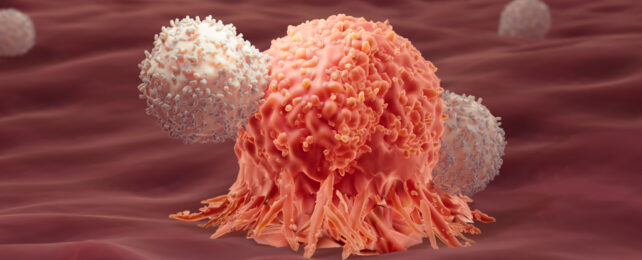Tapping into a cancer patient's "yin and yang" immunity could help boost their chances of survival, according to two new studies. It all comes down to an overlooked type of immune response.
Immunotherapy is an emerging treatment for cancer based on the tweaking of a patient's own defenses to be more effective at fighting its own traitorous cells. As promising as this tactic is, its effectiveness isn't guaranteed.
Investigating why some patients enter long-term remission from this form of treatment while others relapse, scientists found that the more successful cases showed signs of a second immune response.
Intriguingly, this type of immune response was previously thought to do the opposite, aiding cancer growth.
In a follow-up study, researchers compared cancer immunotherapy in mice, using either single or double immune responses. And sure enough, 86 percent of the mice that received the combined treatment were cured of their cancers, while none of the single-response mice survived more than a few weeks.
Better yet, cured mice given new tumors 70 days after treatment successfully fought those off too. The study could lead to new, more effective cancer immunotherapies for humans.
Our immune system is a powerful weapon against cancer, but unfortunately the disease doesn't always play fair. Immunotherapy is designed to restore the upper hand, by removing T cells from a patient, supercharging them with chimeric antigen receptors (CARs) to better target their specific cancer, then returning them to the body. This is called CAR-T cell therapy.
Generally, this kind of immunotherapy works best against leukemia and other so-called liquid cancers. Nonetheless, about half of patients with acute lymphocytic leukemia (ALL) relapse within a year of treatment.
A team led by researchers at EPFL wanted to know whether there was something special about the immune cells of patients who remained in remission for at least eight years after treatment.
They examined extensive data from the first two clinical trials testing CAR-T cell therapy against ALL, creating a genetic atlas of almost 700,000 CAR-T cells from 82 patients to uncover an unexpected pattern unique to those in long-term remission.
The immune system uses a few types of responses to combat pathogens. Type 1 typically targets intracellular threats, such as bacteria, viruses, and cancers, making it the primary tool for cancer immunotherapy.
But these survivors had markers associated with a type 2 immune response, which usually targets larger threats like parasitic worms. A type 2 immune response is presumed to not only be irrelevant to fighting cancer, but may even help the disease grow.
Yet there now seemed to be a statistically significant correlation between long-term remission and type 2 immune factors.
As intriguing as this study is, the researchers stress that they only identified a correlation, not a causation.
Meanwhile, a second study delved deeper into the potential mechanism at play. This time, the team performed CAR-T cell immunotherapy on mice with colon adenocarcinoma, using either type 1 alone or a type 1 and 2 combo. The latter group had modified versions of type 2 immune proteins that lasted longer.
Results mirrored the first study. Of mice receiving the one-two punch, 86 percent were cured, while none of the type 1 mice survived their cancers. Importantly, these mice had solid tumors, which normally don't respond well to immunotherapy.
On closer inspection, the modified immune proteins seemed to be boosting a metabolic pathway known as glycolysis. This gives the T cells a kind of energy boost, which may help them shrug off exhaustion and continue the fight against cancer.
"Our results show that type 1 and type 2 immunity can be thought of in terms of synergy, like yin and yang," says Li Tang, co-author of the studies.
"Our study not only sheds light on the synergy between these two types of immune response, but also unveils an innovative strategy for advancing next-generation cancer immunotherapy by integrating type 2 immune factors."
